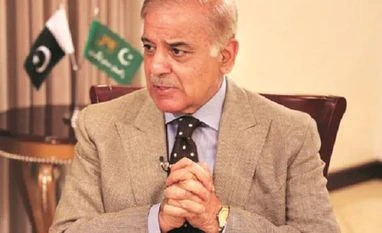Pak PM holds talks with IMF chief to break deadlock over next aid tranche
He also sought relaxation in the demand to increase electricity prices to compensate for the deviation of around Rs 500 billion from the annual circular debt management plan
)
Shehbaz Sharif
Prime Minister Shehbaz Sharif has made a telephonic call to International Monetary Fund chief Kristalina Georgieva to break the deadlock over the release of the next tranche of assistance for cash-strapped Pakistan, according to a media report on Friday.
The contact was made four days before an expected face-to-face meeting between the prime minister and the IMF head on the sidelines of the Geneva Conference for flood victims.
There was no official word about the contact but sources told The Express Tribune that the prime minister urged the IMF managing director to review the condition for the imposition of new taxes.
He also sought relaxation in the demand to increase electricity prices to compensate for the deviation of around Rs 500 billion from the annual circular debt management plan.
These remain the major stumbling blocks in reaching an initial understanding of a staff-level visit by the IMF to Pakistan.
Also Read
"However, the government stood ready to impose flood levy and windfall income tax on commercial banks, the sources added.
There was also a resolve from the Pakistani side to increase the energy prices in future against any further deviation. It was not immediately known whether the IMF MD promised to give any concessions.
Pakistan and the IMF had a round of engagement on November 18 but could not finalise a schedule for formal talks on the overdue ninth review.
The IMF board in August approved the seventh and eighth reviews of Pakistan's bailout programme, allowing for a release of over USD 1.1 billion.
The much-needed bailout package from the IMF helped Pakistan avert an imminent default, amidst the persisting political uncertainty and the devastating floods that have displaced more than 33 million people.
As the economy remains under pressure, the premier also made calls to the Chinese counterpart, Li Keqiang, seeking Beijing's help to avert a looming default while army chief General Asim Munir met the Saudi defence minister in Riyadh.
The contacts were made as the official foreign exchange reserves dipped further to USD 5.6 billion.
The prime minister's call to the IMF head indicates that the finance ministry could not break the gridlock in the past three months, according to The Express Tribune.
In what appeared to be an alternative to the IMF, Finance Minister Ishaq Dar, a day earlier, had expressed the hope of receiving a USD 3 billion second bailout from Saudi Arabia within days, vowing to raise money through the sale of assets to beef up the critically-low foreign exchange reserves. But the Saudi cash assistance can only delay the default, as it cannot permanently solve the problem.
The finance minister had said that the government was committed to the IMF programme. But at the same time, he added: We will not take measures that may increase the burden on the common man.
The IMF had earlier asked for a plan to end the additional Rs 500 billion circular debt, increase energy prices, imposition of new taxes, let the rupee gain its real value and achieve the primary budget surplus targets, excluding flood-related expenses the conditions that will stoke inflation that is already standing at 25 per cent, according to the Express Tribune.
The donor last year restored the stalled USD 6 billion loan programme which was initially agreed upon in 2019 but was put on hold as Pakistan failed to implement its conditions.
However, it has again refused to release more funds as Pakistan faltered to fulfil fresh commitments.
(Only the headline and picture of this report may have been reworked by the Business Standard staff; the rest of the content is auto-generated from a syndicated feed.)
More From This Section
Don't miss the most important news and views of the day. Get them on our Telegram channel
First Published: Jan 06 2023 | 3:05 PM IST


